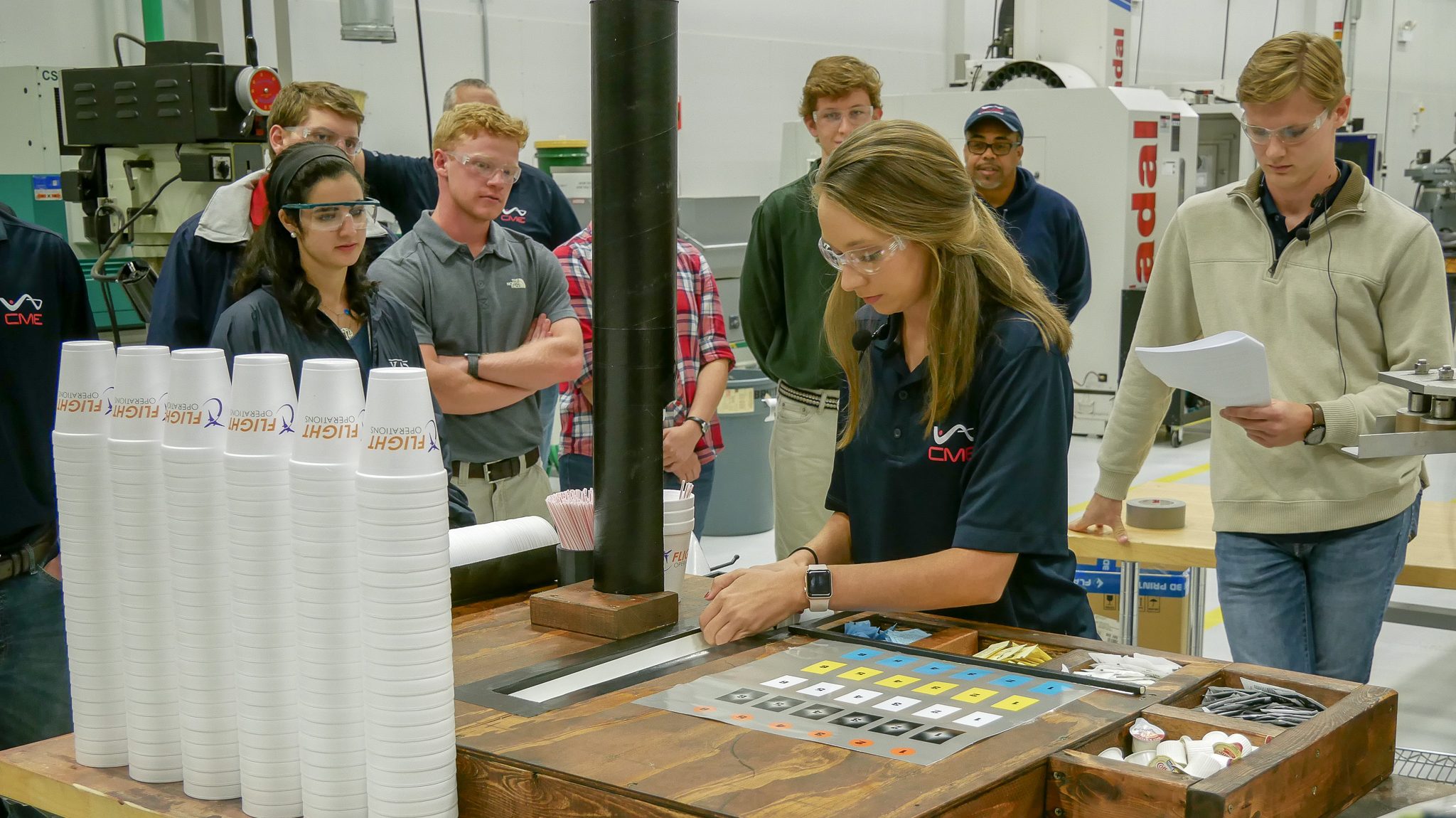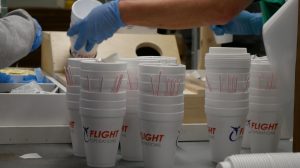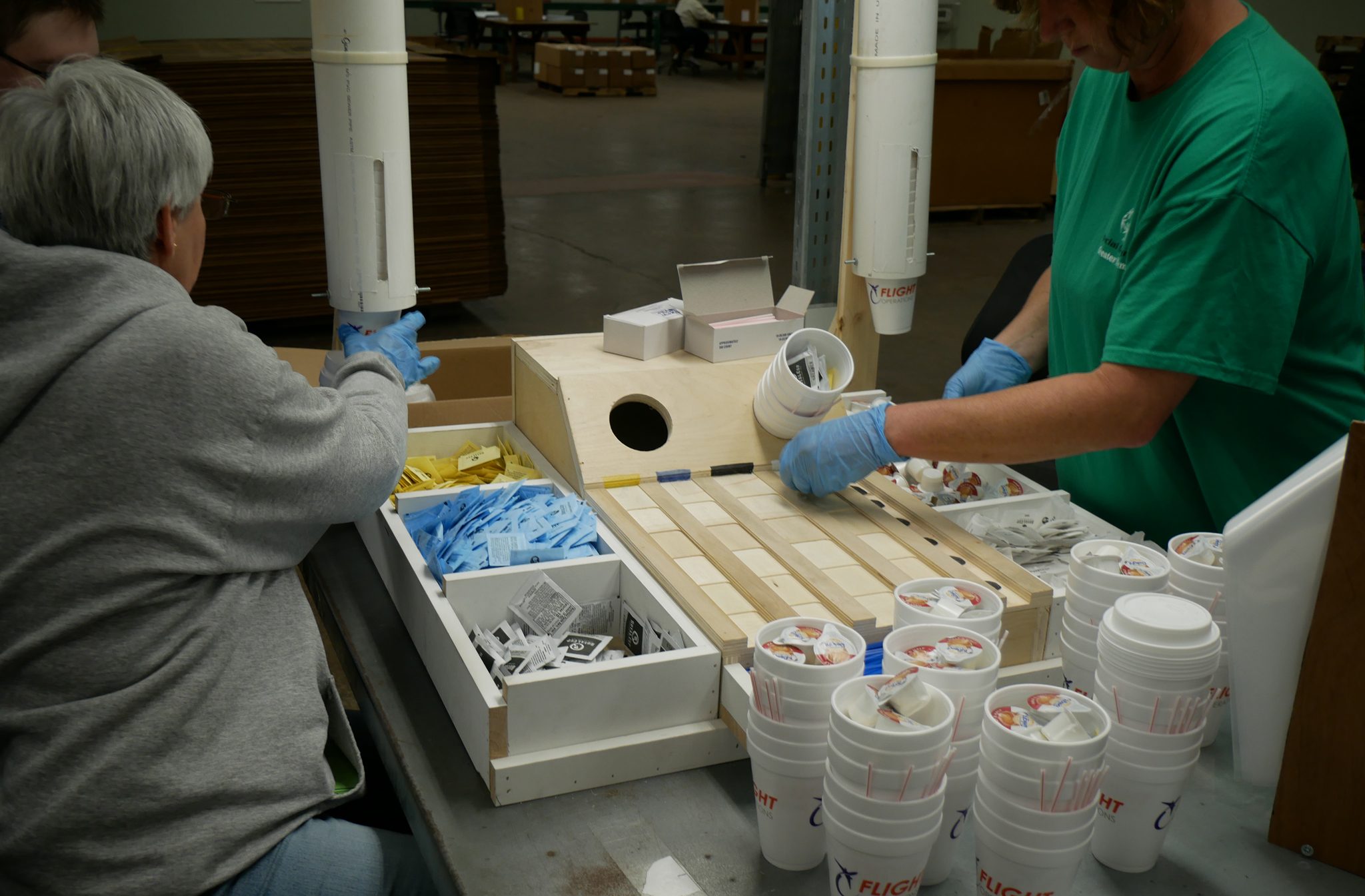
Students in MANF 350: Standardized Work/Takt Time at the UM Haley Barbour Center for Manufacturing Excellence create assembly cells for workers at The Baddour Center to use in completing coffee condiment kits. Photo by Tyler Biggs
OXFORD, Miss. – Eddie Carr wasn’t searching for another manufacturing class project for his University of Mississippi students, but he walked into one that has allowed his students to help a small north Mississippi nonprofit.
An extension service instructor at the Haley Barbour Center for Manufacturing Excellence at UM, Carr had some extra time earlier this fall after a business meeting in Batesville was canceled. He was due in Senatobia for another appointment, but arriving early, he stopped by The Baddour Center, which he had worked with during his career in private industry.
The center in Senatobia provides a residential community for adults with mild to moderate intellectual and developmental disabilities. Part of the community includes Baddour Custom Packaging, which supplies center clients with jobs and incomes while also providing fulfillment, distribution, storage and warehousing for businesses ranging from small clients to Fortune 100. The custom packaging division employs more than 100 clients of the center.
There, he met Kristi Webb, director of vocational services at Baddour, and she described to him a unique problem. The center had just signed a contract to package 7,200 Royal Cup Coffee condiment kits a month for inclusion on FedEx planes flying out of Memphis International Airport.
How best to efficiently package these kits – with each kit containing cups, lids, stirrers, sugar, two different sugar substitutes, non-dairy creamer and half-and-half – was the issue.
Carr immediately knew he had another project for his MANF 350: Standardized Work/Takt Time students at the Center for Manufacturing Excellence, or CME. The 45 students in the class, which includes intensive training on a manufacturing factory floor, had begun their studies with a three-day training session at the Nissan Canton Vehicle Assembly Plant.
“The students’ assignment for the Baddour project was to design and build an assembly cell for the coffee service kits, utilizing the parametric data I gave them on production rate, cost and demand,” Carr said. “The students learn so much from an experiential learning class. They are taught the concepts in a classroom setting but really learn more from the hands-on experience.
“The students did outstanding work. Each group was assigned a faculty or staff member from the CME, along with one of the CME manufacturing technicians. The support personnel were there to help guide their efforts and to assist with constructing their design on the plant floor of the CME.”

Students in the UM Haley Barbour Center for Manufacturing Excellence designed assembly cells to help clients at The Baddour Center fabricate coffee condiment kits for inclusion on FedEx planes. Photo by Tyler Biggs
The result of the students’ work – the students were split into three teams of 15 – were two assembly cells that allow Baddour clients to systematically and accurately fabricate each kit, which pilots need for their onboard coffee when flying thousands of miles, sometimes in the dead of night. The cells were created at the CME and moved to The Baddour Center for fine-tuning, with clients using the cells for assembling the kits by early November.
“The Center for Manufacturing Excellence delivered perfect workstation designs for our environment and mission,” Webb said. “The workstations put us in position to meet production demands more quickly with a shorter learning curve. We will never be able to repay CME for the support and experience.”
The experience also exposed the center to talented Ole Miss students, who, in turn,were provided a glimpse of the abilities and talents of people with intellectual and developmental disabilities, Webb said.
“The project brought two major companies, a great university and a small nonprofit together for a good cause,” she said. “It was a win, win, win, win.”
The academic learning model at the CME, which was established in 2008, offers students practical experiences, fundamental knowledge and creative skill sets needed to lead in the world of modern manufacturing. One of the fundamental aspects of lean manufacturing is going to the factory floor and seeing what is happening, said Matt O’Keefe, CME executive director and UM professor of chemical engineering.
“Working with The Baddour Center and other CME partners, affords the students an opportunity to apply the concepts taught in class to practical application,” he said. “The positive reinforcement the students receive when they see their design or process being used provides a level of satisfaction and accomplishment that can’t be duplicated in a classroom setting.”
Megan Staffieri, a junior from Lucedale, was one of the CME students involved in creating an assembly cell for The Baddour Center. The CME is a fantastic resume builder through its classes alone, but the real-world experiences provide students with confidence and knowledge to succeed outside the classroom, said Staffieri, who is pursuing a bachelor’s degree in mechanical engineering with an emphasis in manufacturing.
“I know a lot of companies are impressed with the CME program and are more likely to hire students coming out of school because of the real-world experience we get through their classes,” she said. “The CME has built a reputation for developing hardworking individuals who strive for excellence.”
Providing economic and workforce development assistance to manufacturing companies throughout the state is an important aspect of the CME mission, O’Keefe said.
“Through outreach and extension services the students, faculty and staff in CME are working with industries in Mississippi to improve production operations that ensure competitiveness in a global economy,” he said. “This, in turn, improves the local communities’ health and well-being through the employment and economic growth.”
And that experience outside the classroom becomes something more than a resume entry when it assists the local community, Staffieri said.
“Ole Miss has a huge population of students, and if we all take pride in Oxford and its surrounding areas, then we can really make a difference in the community,” she said. “Luckily for me and my fellow students, we get to help out the community while building real-world experience.
“I think that is my favorite thing about the CME program: you get to build relationships with people that you care about, and they care for you right back.”
